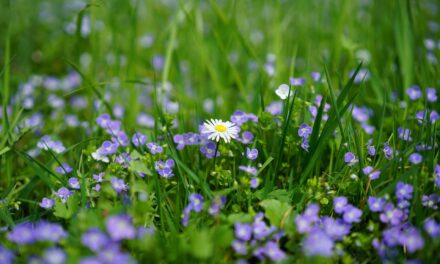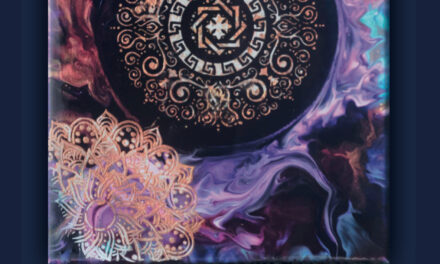My wife leaves clumps of hair in the shower drain. I pick them up so she doesn’t have to. She cleans the shower walls so I don’t have to. We’ve gone on this way forty years.
* * *
My wife recalls a moment from our college days, when she climbed the steps of the student union and the room began to spin and she went a little breathless. That’s when she knew she had fallen in love with me.
I don’t understand the phrase fallen in love: the way it uses love doesn’t correspond to anything I recognize. Fallen into intense emotion, maybe. And yet fallen in love must count for something, since she still scrubs the shower walls for me.
* * *
So if fallen in love doesn’t make sense, what does? We could ask the sacred traditions; they mention love a lot. The Christian Bible even says God is love, but God defies description, so that’s no help. Bodhisattvas, those embodiments of Buddhist compassion, vow to save all beings, which has to qualify as love.
None of them refer to shower drain hair. Maybe we need some new sacred traditions.

I don’t recall a falling in love moment with my wife, like hers at the student union. Early in our first year we studied for an exam together, and she broke down in tears and we talked for three hours. From there we fell into a slow-growing friendship that, by the end of our second year, blossomed into something else.
The something else included more hours of talking. We’ve never stopped. Friends wonder why we didn’t run out of topics years ago. Whatever else the new sacred traditions say about love, talking should be in there.
I’ve heard that talk and friendship don’t always lead to falling in love, and even if they do, they may not keep you in love. My experience has been different. Forty years on, she walks into view and my heart flutters.
* * *
This summer we watched a robin hatch her eggs just under our eaves. Today, one of the fledglings nestles in the uncut grass near the swing where I work, shifting her gaze from side to side. For a few minutes she becomes my favorite niece: I’ve watched her grow up into this vibrant young being, and my chest expands and my breath catches and I am glad, a word I’ve never used before. Is that love? I’m not sure, but this is: stopping my work to keep an eye on her, making sure she can hop and fly.
* * *
We’ve watched our own child too, paying attention to her biggest milestones and subtlest shifts. In the dark times paying attention was all we could do. I never mastered child rearing, but from the beginning I was hell-bent on learning how to raise this child, and close attention was a big part of it.
At some points in her childhood I wanted her to become something special. Now, in her mid-thirties, I have stopped wanting. I watch who she is and my chest expands and I am glad again.
Love is somewhere in there, many places perhaps, but where exactly I can’t tell you.

Maybe we start the new sacred traditions this way: If everything is interwoven, as the Buddhists say, then the cosmos is a garden, and love means tending it. Anything I do to make it blossom is love, whether it blossoms in me, or you, or an ant.
* * *
My wife and I fought like mad in our first five years of marriage. She thought about leaving me during our daughter’s dark times. Later I discovered I was something different from the person she married—different in gender, in earning power—and even now, not all the differences make a comfortable fit. We address them as we would exposed wires, delicately when we need to, not at all when we don’t.
I wouldn’t call any of these facts love per se. They’re more like raw materials, the vegetable scraps that turn into compost that feeds the dirt where blossoms live.
* * *
The strangest thing about blossoms is their inefficiency: an awful lot of spadework goes into that one big flourish. And some parts of the labor are less glorious than others. Which is how wedding vows, three-hour talks, and shower drain hair removal all qualify as love.
But oh, that flourish. One day I look out and there it is—a splashy rose on an arbor, a child turning a corner, a fledgling in flight. My breath catches and maybe this time, falling in love does mean something, different from the way I’ve always heard it, as different as a blossom looks when you’ve had your hands in the dirt beneath.








Finite definitions are not always useful.
I agree. In a way, writing this essay reminded me of that. I began developing it with the idea of discarding popular conceptions of love in favor of elements like faithfulness, setting aside self for the good of the other, etc. The more the essay developed, though, the more I realized it wasn’t my job to even define, let alone discard, but rather to explore and encompass all the definitions and hold them lightly, because love can be so elusive. I hope that’s useful.